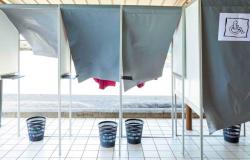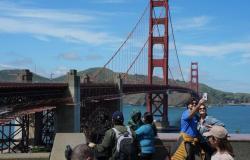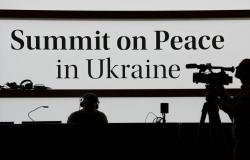Tens of millions of Europeans are voting on Sunday in around twenty countries to elect a new European Parliament, where the political balance could be modified by the announced surge of the far right, particularly in Italy and France.
Under a spring sun, like almost everywhere in Europe, Greece kicked off, followed by most of the other countries of the European Union, including Germany, France and Spain.
The current right/socialist/liberal “grand coalition”, which forges compromises in the European hemicycle, should, according to polls, retain the majority there, but it could see its room for maneuver reduced, forcing it to find strength of support and auguring intense negotiations in the weeks to come.
“I think the European Union will only succeed if it stands together and stays together. I think it’s important to stand on the side of peace and democracy, especially in this world where everyone is looking for to isolate yourself from others,” commented Tanja Reith, a 52-year-old German voter.
Nearly two and a half years after the start of the Russian invasion of Ukraine, and the concerns it arouses across Europe, more than 360 million EU citizens are called to the polls to nominate 720 members of the European Parliament.
The Netherlands launched the vote on Thursday by confirming a surge by Geert Wilders’ far-right party, although it would have to settle for second place behind the social-democrat and environmentalist coalition, according to estimates.
Von der Leyen votes in Lower Saxony
The President of the European Commission, the German Ursula von der Leyen, who is seeking a second five-year term, voted mid-morning in Burgdorf, Lower Saxony, in the company of her husband.
“I hope that a pro-peace majority will emerge from these elections,” Hungarian Prime Minister Viktor Orban said after voting in Budapest. Always very critical of Brussels, the nationalist leader is also increasing attacks against NATO, accusing it of dragging the Alliance countries into a “global conflagration”.
Ferenc Hamori, 54, a physical education teacher who voted in a village near Budapest, said the EU would be in a better position if it had more leaders like Mr Orban. “He will win the elections here, but he will always be in the minority in Brussels,” he regrets.
In countries neighboring Russia at war with Ukraine, security concerns some voters.
“I would like security to be strengthened (…) or even the deployment of a European contingent on our territory,” says Andrzej Zmiejewski, a 51-year-old doctor, after voting in Warsaw.
Mobilization
The mobilization of the electorate is one of the major challenges of the election.
In France, where 49 million voters are called to the polls to nominate 81 MEPs, President Emmanuel Macron called for a barrier to the far right, believing that the risk was that Europe would find itself “blocked”.
Participation reached 19.81% at noon compared to 19.26% during the previous election in 2019.
The latest polls place the National Rally, led by Jordan Bardella, well ahead with more than 30% of the vote, far ahead of Renaissance, the French president’s party, then the social democratic left led by Raphaël Glucksmann.
In Germany, the far right gathered behind the AfD is also in ambush, despite the latest scandals which have splashed its head of the list.
If the German conservatives of the CDU-CSU should come well ahead, with 30.5% of the votes, according to a poll, the party of social democratic chancellor Olaf Scholz, the SPD, should experience a bitter failure. The SPD and the Greens are battling for second place with the AfD, which is capitalizing on a gloomy economic situation and fears linked to immigration.
“More and more divided”
The vote takes place two days after the attack suffered by Prime Minister Mette Frederiksen, and more than three weeks after the attack on her Slovak counterpart, the populist Robert Fico.
In Italy, where voting began on Saturday, the post-fascist Fratelli d’Italia (FDI) party of head of government Giorgia Meloni could send 22 MEPs to the hemicycle, compared to six currently.
This election “will determine the next five years”, assured Saturday Ms. Meloni, who presented herself as head of the list in this election. She reaffirmed her desire to “defend the borders against illegal immigration, protect the real economy, and fight against unfair competition”.
The Spanish Prime Minister, the socialist Pedro Sanchez, encouraged voters to go to the polls. “What is decided today is of enormous importance for the future of Spain and for the future of Europe,” he said after voting in Madrid.
The first task of MEPs will be to confirm – or refute – the choices of the leaders of the member countries for the presidency of the Commission.
If the 27, who meet at a summit in Brussels at the end of June, opt for a reappointment of Ursula von der Leyen, the Parliament vote, which should, barring any surprises, take place during a plenary session in Strasbourg in mid-July, will be carefully scrutinized.
In 2019, when she was appointed to this position to everyone’s surprise, Parliament only gave her its confidence by a very narrow majority (nine votes).
This article was automatically published. Sources: ats / afp






